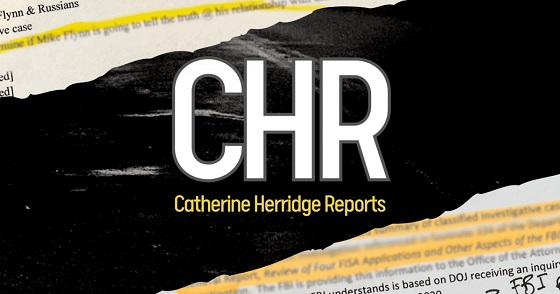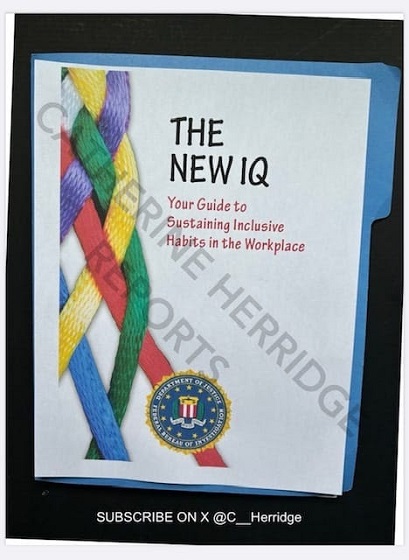Catherine Herridge
How X And Joe Rogan Broke The Back of 60 Minutes

| TOP LINE: | |||||||||||||||
| Super consumers of news are flocking to X and other platforms that support independent journalism, diverse voices and embrace transparency. The post election TV ratings abyss is driven both by technology and by the public’s loss of trust in Mainstream media. | |||||||||||||||
| DEEP DIVE: | |||||||||||||||
| To buy MSNBC or not to buy? | |||||||||||||||
| This week’s headline that Comcast will spin off its cable channels underscores the tectonic shift in the media marketplace and how technology is providing the exit ramp for competing platforms. | |||||||||||||||
| When my job as a senior investigative correspondent at CBS News was terminated in February, I took a few months to educate myself about the marketplace because so much had changed since I left Fox in 2019. What I found was genuinely surprising, a little frightening and, oddly, re-assuring for the strength of our democracy. | |||||||||||||||
| You can’t argue with the data. It is compelling. On Election Day, according to @Xdata, the platform boasted record usage of 942 million posts worldwide and 2.2 million hours of watch or listen time over approximately 160k live events. The X data crushed engagement numbers for the mainstream media (MSM.) | |||||||||||||||
|
|||||||||||||||
| By example, a Tucker Carlson interview on X has 35 million engagements. The CBS Evening News has 4.5 million viewers. If I had to choose, I’d take 30 million engagements on X because it represents explosive growth. | |||||||||||||||
|
|||||||||||||||
| The new super consumers of news are flocking to X and other platforms that support independent journalism, diverse voices, and embrace transparency which can strengthen democracy. This is nothing short of an industrial revolution driven both by technology and by loss of trust in corporate media. | |||||||||||||||
| In 2023, Human Rights lawyer Jacob Mchangama wrote about the upheaval and resulting, “elite panic.” | |||||||||||||||
| “Elite panic is this recurring phenomenon throughout the history of free speech, where whenever the public sphere is expanded, either through new communications technology, or to segments of the population that were previously marginalized, the traditional gatekeepers, the elites who control access to information, tend to fret about the dangers of allowing the unwashed mob — who are too fickle, too unsophisticated, too unlearned — unmediated access to information. They need information to be filtered through the responsible gatekeepers and it may be even more dangerous to allow them to speak without adult supervision. That’s a phenomenon that we see again and again. And we’re seeing it play out now on social media. … [Elite panic is] one contributing factor to the free speech recession.” | |||||||||||||||
|
|||||||||||||||
| If you asked me four years ago, if a presidential candidate could skip a 60 Minutes interview, I would have been skeptical. Four years later, candidate Trump bypassed the legacy news magazine and instead, sat down with Joe Rogan. As of this writing, the marathon sit-down viewership reached 51 million views. | |||||||||||||||
| There is no doubt Rogan is a skilled interviewer who can draw out his subjects and deliver huge audiences. Compared to heavily edited network TV reports, the raw, unedited format reveals much about the subject. In politics, the podcast is perfectly suited for the “beer question” which measures a candidate’s authenticity and likability. | |||||||||||||||
| The progressive Harris campaign took a more traditional media approach and came up short. Neither celebrity endorsements which feel less relevant nor a 60 Minutes interview seemed to move the needle. The combined audience of the 60 Minutes Kamala Harris interview and its views on YouTube landed at about 10 million, far less than what Rogan and X delivered. | |||||||||||||||
| The legacy of the Kamala Harris 60 Minutes interview is not her responses but the lingering controversy over the CBS’ interview edit. And that is where the public’s loss of trust in the media comes in. I believe this is another driver of the audience exodus. | |||||||||||||||
| CBS aired two different answers from the Vice President to the same question from correspondent Bill Whitaker about the Israeli Prime Minister apparently ignoring the Biden Administration. | |||||||||||||||
|
|||||||||||||||
| Since, a credible complaint has been filed at the FCC alleging “news distortion” at the network with a reasonable demand that the full, unedited Kamala Harris transcript be released. CBS News has said “it fairly presented the interview to inform the viewing audience and not to mislead it.” | |||||||||||||||
| In the October newsletter, I explained that releasing the full, unedited transcript would resolve these questions. There is ample precedent. | |||||||||||||||
|
|||||||||||||||
| As a senior investigative correspondent at CBS News, I interviewed President Trump at the height of the COVID-19 pandemic. I advocated for and CBS News published the full, unedited transcript. | |||||||||||||||
| The CBS News Trump interview was not a special case. The full, unedited transcript from Attorney General Bill Barr’s 2019 interview with CBS chief legal affairs correspondent Jan Crawford was also shared by the network. And more recently, 60 Minutes released the full unedited transcript of its interview with Fed Chair Jerome Powell. | |||||||||||||||
| If the current trend continues, in the 2028 election cycle, the broadcast networks will firmly take a back seat to podcasts, town halls, and investigative journalism on X. For independent journalists and small digital newsrooms, the challenge is developing revenue streams that are viable. | |||||||||||||||
| In February, I was not comforted by the analogy that losing my corporate reporting job was like getting pushed off the Titanic when there were still seats in the lifeboats. In retrospect, I wonder if it may turn out to be more accurate than I initially thought. | |||||||||||||||
| After turning down job offers for which I remain grateful, I began building the Catherine Herridge Reports brand on X and in the newsletter marketplace. These platforms are the new media beachheads. Content is King. | |||||||||||||||
| I’ll have more to say about the future of journalism and why journalism is called a profession for a reason. Look for exclusive new content on media accountability in the coming days! | |||||||||||||||
| Thank you for subscribing to our newsletter and supporting independent investigative journalism! |
Catherine Herridge
FBI imposed Hunter Biden laptop ‘gag order’ after employee accidentally confirmed authenticity: report

From LifeSiteNews
Two independent journalists found that the FBI could have set the record straight by confirming the laptop was real and the subject of an ongoing criminal probe. Instead, FBI leadership allowed the false narrative about the laptop to gain momentum.
In a shocking report published on X, independent journalists Catherine Herridge and Michael Shellenberger revealed that an FBI agent accidentally confirmed to Twitter (now known as “X”) that the Hunter Biden laptop story was real less than three weeks before the 2020 election.
“For the first time, and with a change of administration, the FBI has now turned over to GOP House investigators the internal chat messages that show Bureau leadership actively silenced its employees,” Herridge and Shellenberger wrote on X.
“The FBI, which had a special task force to counter foreign election interference, could have set the record straight by confirming the laptop was real and the subject of an ongoing criminal probe,” the journalists explained. “Instead, FBI leadership allowed the false narrative about the laptop to gain momentum.”
“In 2024, an FBI official admitted to House investigators that an FBI employee had inadvertently confirmed the authenticity of Hunter Biden’s laptop to Twitter on a conference call the morning of October 14, 2020, the day the New York Post published a story about it,” Shellenberger wrote.
“I recall that when the question came up, an intelligence analyst assigned to the Criminal Investigative Division said something to the effect of, ‘Yes, the laptop is real,’” testified the then-Russia Unit Chief of the FBI’s Foreign Influence Task Force in a closed-door transcribed interview,” according to Herridge and Shellenberger. “I believe it was an (Office of General Counsel) attorney assigned to the (Foreign Influence Task Force) stepped in and said, ‘We will not comment further on this topic.’”
They recounted this exchange:
An individual whose name is blacked out, tells Elvis M. Chan, the San Francisco-based FBI special agent tasked with interacting with social media companies, there was a “gag order” on discussion of Hunter Biden’s laptop. In a separate exchange, Chan is told “official response no commen(t).”
In the chat, the FBI officials showed awareness that the laptop may have contained evidence of criminal activity.
Asked Chan, “actually what kind of case is the laptop thing? corruption? campaign financing?”
Another FBI employee responds, “CLOSE HOLD —” after which the response is redacted.
To which Chan responds, “oh crap,” appearing to underscore the serious nature of the probe, which included felony tax charges. Chan adds, “ok. It ends here.”
In the same conversation, Chan is asked if “anyone discussing that NYPost article on the Biden’s?” Chan responds, “yes we are. c d confirmed an active investigation. No further comment.” “C D” is likely shorthand for the FBI’s Criminal Division.
Said another FBI employee, whose name was redacted by the Bureau, “please do not discuss biden matter.”
It’s now common knowledge that national security agencies — including the FBI and CIA, Big Tech, and much of corporate media — colluded in suppressing truth and manufacturing lies in order to drag their preferred candidate, Joe Biden, across the finish line in the 2020 presidential election.
Incriminating evidence discovered on the laptop that Hunter Biden had long ago abandoned at a computer repair shop — reported on in two devastating pieces by the New York Post at the time — was ignored by mainstream media, fraudulently dismissed by former national intelligence officials, and essentially made inaccessible to the public by Big Tech social media sites Twitter and Facebook.
The computer contained emails showing that then-Vice President Biden had come under the influence of bad actors in Ukraine and Communist China and had used his powerful position in the Obama administration to pressure government Ukrainian officials into firing a prosecutor who was investigating the energy firm, Burisma, which was paying the younger Biden $50,000 per month to sit on its board of directors.
Catherine Herridge
How ‘Woke’ Broke The FB

 Catherine Herridge
Catherine Herridge
We Obtain Internal FBI DEI Guide On Managing Unconscious Bias
| TOP LINE |
| An internal FBI inclusivity “Guide,” obtained by our investigative team, counseled agents on “Ways to Manage Your Unconscious Bias,” “Micro-Inequities” and “How to Improve Your Inclusive Intelligence.” |
| “The New IQ: Your Guide to Sustaining Inclusive Habits in the Workplace” was widely shared in mid-2020 and includes nine “tips” to counter unconscious bias. |
|
||||||||||||||||||||||||
|
-

 International1 day ago
International1 day agoPope Francis has died aged 88
-

 International1 day ago
International1 day agoPope Francis Dies on Day after Easter
-

 International1 day ago
International1 day agoJD Vance was one of the last people to meet Pope Francis
-

 2025 Federal Election16 hours ago
2025 Federal Election16 hours agoOttawa Confirms China interfering with 2025 federal election: Beijing Seeks to Block Joe Tay’s Election
-

 Energy1 day ago
Energy1 day agoIndigenous-led Projects Hold Key To Canada’s Energy Future
-

 2025 Federal Election5 hours ago
2025 Federal Election5 hours agoBREAKING: THE FEDERAL BRIEF THAT SHOULD SINK CARNEY
-

 2025 Federal Election1 day ago
2025 Federal Election1 day agoCarney’s budget means more debt than Trudeau’s
-

 2025 Federal Election16 hours ago
2025 Federal Election16 hours agoReal Homes vs. Modular Shoeboxes: The Housing Battle Between Poilievre and Carney


















